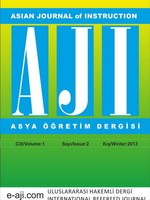INTERCULTURAL EDUCATION IN THE CIVIL EDUCATION IN THE CURRICULA OF THE GREEK SCHOOL(ELEMENTARY-HIGH SCHOOL)
-
INTERCULTURAL EDUCATION IN THE CIVIL EDUCATION IN THE CURRICULA OF THE GREEK SCHOOL(ELEMENTARY-HIGH SCHOOL)
curricula, geography, civil education, multiculturalism, cultural diversity coexistence,
___
- Αnagnostopoulou, M. & Maniati, E. (2006). Teachers’ views on social polymorphy and intercultural education. Proceedings from the 11th Conference of Pedagogical Association of Greece with topic: The school in the society of Information and Multiculturalism, Kyriades: Thessaloniki pp. 713-720
- Government Paper (2003). Inter-disciplinary Unified Curricula Study Programme. 303/31.03.2003, v. 2
- Ministry of Education, Long Life Learning and Religions (2011) Curricula for the teaching of Geography. Elementary School. Athens. Available at: http://digitalschool.minedu.gov.gr/info/newps/%CE%A6%CF%85%CF%83%CE%B9%CE%BA%CE%AD%CF%82%20%CE%B5%CF%80%CE%B9%CF%83%CF%84%CE%AE%CE%BC%CE%B5%CF%82/%CE%93%CE%B5%CF%89%CE%B3%CF%81%CE%B1%CF%86%CE%AF%CE%B1%20%CE%94%CE%B7%CE%BC%CE%BF%CF%84%CE%B9%CE%BA%CE%BF%CF%8D.pdf (May 23, 2014)
- Ministry of Education, Long Life Learning and Religions (2011) Curricula for the teaching of Geography. High School. Athens. Available at: http://digitalschool.minedu.gov.gr/info/newps/%CE%A6%CF%85%CF%83%CE%B9%CE%BA%CE%AD%CF%82%20%CE%B5%CF%80%CE%B9%CF%83%CF%84%CE%AE%CE%BC%CE%B5%CF%82/%CE%93%CE%B5%CF%89%CE%B3%CF%81%CE%B1%CF%86%CE%AF%CE%B1%20%CE%93%CF%85%CE%BC%CE%BD%CE%B1%CF%83%CE%AF%CE%BF%CF%85.pdf (May 23, 2014)
- Ministry of Education, Long Life Learning and Religions (2011) Curricula for the teaching of Social and Civic Education. Elementary School and High School. Athens. Available at: http://digitalschool.minedu.gov.gr/info/newps/%CE%9A%CE%BF%CE%B9%CE%BD%CF%89%CE%BD%CE%B9%CE%BA%CE%AD%CF%82%20%CE%B5%CF%80%CE%B9%CF%83%CF%84%CE%AE%CE%BC%CE%B5%CF%82%20%CE%BA%CE%B1%CE%B9%20%CE%99%CF%83%CF%84%CE%BF%CF%81%CE%AF%CE%B1/%CE%A0%CE%A3%20%CE%9A%CE%BF%CE%B9%CE%BD%CF%89%CE%BD%CE%B9%CE%BA%CE%AE%20%CE%BA%CE%B1%CE%B9%20%CE%A0%CE%BF%CE%BB%CE%B9%CF%84%CE%B9%CE%BA%CE%AE%20%CE%91%CE%B3%CF%89%CE%B3%CE%AE%20%E2%80%94%20%CE%94%CE%B7%CE%BC%CE%BF%CF%84%CE%B9%CE%BA%CF%8C.pdf (May 23, 2014)
- Ministry of Education, Long Life Learning and Religions (2011) Curricula for the teaching of Social and Civic Education. High School. Athens. Available at: http://digitalschool.minedu.gov.gr/info/newps/%CE%9A%CE%BF%CE%B9%CE%BD%CF%89%CE%BD%CE%B9%CE%BA%CE%AD%CF%82%20%CE%B5%CF%80%CE%B9%CF%83%CF%84%CE%AE%CE%BC%CE%B5%CF%82%20%CE%BA%CE%B1%CE%B9%20%CE%99%CF%83%CF%84%CE%BF%CF%81%CE%AF%CE%B1/%CE%A0%CE%A3%20%CE%9A%CE%BF%CE%B9%CE%BD%CF%89%CE%BD%CE%B9%CE%BA%CE%AE%20%CE%BA%CE%B1%CE%B9%20%CE%A0%CE%BF%CE%BB%CE%B9%CF%84%CE%B9%CE%BA%CE%AE%20%CE%91%CE%B3%CF%89%CE%B3%CE%AE%20%E2%80%94%20%CE%93%CF%85%CE%BC%CE%BD%CE%AC%CF%83%CE%B9%CE%BF.pdf (May 23, 2014)
- Μitropoulou,V., Rantzou, M., Anagnostopoulou, M. (2013). Intercultural Education in the Curricula of the Greek Schools (Elementary - High School). Proceedings from the 16th Conference of Balkan Society for Pedagogy and Education: “The Image of the Other/the Neighbour in the Educational Systems of the Balkan Countries. (to be published).
- Yayın Aralığı: Yılda 2 Sayı
- Başlangıç: 2013
- Yayıncı: Yeni Eğitim Yayıncılık
ÜNİVERSİTE FEN BİLİMLERİ BİRİNCİ SINIF ÖĞRENCİLERİNİN EVRİM TEORİSİNİ KABUL DÜZEYLERİ
ÖĞRENCİLERİN SINIF İÇİ TUTUM VE DAVRANIŞLARININ ÖĞRETMENLERİN SINIF YÖNETİMİ BAŞARISINA ETKİSİ
TÜRKÇENİN YABANCI DİL OLARAK ÖĞRETİMİNDE KALIP SÖZLERİN ETKİNLİKLERLE ÖĞRETİMİ
Fatih YILMAZ, Yasemin ERTÜRK ŞENDEN
İLKÖĞRETİM MATEMATİK ÖĞRETMENİ ADAYLARININ YANSITICI DÜŞÜNME DÜZEYLERİNİN İNCELENMESİ
STRUCTURAL QUALITY IN PRESCHOOLS: ENVIRONMENTAL INDICATORS
OTİZMLİ ÇOCUKLARDA MATEMATİK ÖĞRETİMİNDE KARŞILAŞILAN GÜÇLÜKLER
ANNE EĞİTİM DÜZEYİNİN VE CİNSİYETİN ÇOCUKLARIN AHLAK KURAL BİLGİSİ ALGILARINA ETKİSİNİN İNCELENMESİ
Vasiliki MITROPOULO, Maria RANTZOU, Maria ANAGNOSTOPOULOU
GENÇ YETİŞKİNLERDE İYİMSERLİĞİN MUTLULUK VE YAŞAM DOYUMU ÜZERİNDEKİ ETKİSİNİN İNCELENMESİ
